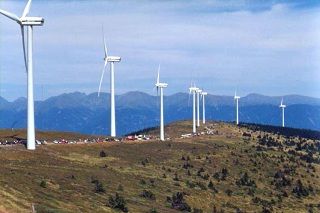Artificial Economic Supports for Wind Energy Are Inherently Flawed
These articles on India’s “generation-based incentive” and the “production tax credit” here in the U.S. call to mind a sad fact: government incentives that are designed to produce more wind energy are deeply flawed.
First, turning these incentives on and off, and the uncertainty that this process breeds, is a huge deterrent to the capital formation necessary for a profitable and efficient wind industry. But at least as damaging to the overall benefit of wind is the fact that the grid’s ability to accept more energy from this source varies hugely from one location to another. The idea that bureaucrats will come up with a plan that will provide sane, long-term incentives for the wind energy industry to do the right thing is fanciful at best.
This serves as another reminder of the value of letting market forces work themselves out. Imagine a truly market-based approach:
Want to burn coal? No problem, just pay the full costs, including the damage to our lungs and natural environment. If that’s unacceptable, don’t burn coal. It’s the same thought process that we use when we buy a new car or a bottle of wine: if the price is too high, we look elsewhere.
Want more nuclear reactors? Fine, but don’t ask the tax-payer to subsidize them by paying the insurance premiums, dealing with the waste for the next 500,000 years, and covering the many other costs that come as a direct result.
Pretty soon (i.e., immediately) the cost of solar and wind – as well as geothermal, biomass and hydrokinetics) look quite attractive. Having said that, don’t look for government support if you want to build wind farms in Oregon, where the availability of hydro is enormous and the cost of base-load and dispatchable energy for peak conditions is very low.
It would be interesting to see Adam Smith’s “invisible hand” at work in the energy markets, in a world without artificial supports.


It would indeed be interesting to see an honorable version of Adam Smith’s invisible hand at work.
However, I’ll point out – at the risk of the charge that I’m beating a dead horse – the glaring fact that the most potent invisible hand of the fiscal forces in our nation, and across the world, currently acts with surreptitious and meticulous diligence, and devastating success, to pocket all our “public servants” and to discredit/overwhelm/buy off any competitive disruptive technologies that emerge.
It occurs to me that the paper tigers that are our entrenched fossil interests, and other elite powers, such as the financial, pharmaceutical and agricultural lobbies – rather than an invisible hand – may be better visualized as a gargantuan and poisonous leech buried in the flesh of our nation’s laboring aorta.
These interests, as a group, feed lavishly upon the wide effects of their influence deep within what ought to be a government of, for, and by the whole of the people. The theories that are often quite subtly fostered – within a mass media over which they hold similar influence – are that any attempt to dislodge this leech threatens to cause a lethal hemorrhage, or that the leech is merely a useful and natural organ and is present by right.
Nevertheless, efforts are well underway across our beautiful country to stop the bribery and confine this collection of ravenous and sociopathic beasts to their proper paper status, and to the legal cages for which they were intended. The challenge is that, ultimately, these valiant and noble efforts are at least partly dependent upon the cooperation of the bribed.
If we had a free government of the people that was genuinely focused upon the aims for which it was designed, “to form a more perfect union, establish justice, insure domestic tranquility, provide for the common defense, promote the general welfare, and secure the blessings of liberty to ourselves and our posterity” – and if all costs and damages were then prevented from being hidden and externalized – greed would find itself quite properly shackled, harnessed and directed to work for the good of the people and the biosphere upon which the people will always depend.
Let’s then move to free our government of that parasitic leech that now replaces the blood of honor with the poison of greed, and to confine the paper beasts to the cage of law and bind them to their costs and damages.
Until we resolve this bribery issue, the roadblocks – and our debts to nature and our progeny – will continue to mount.